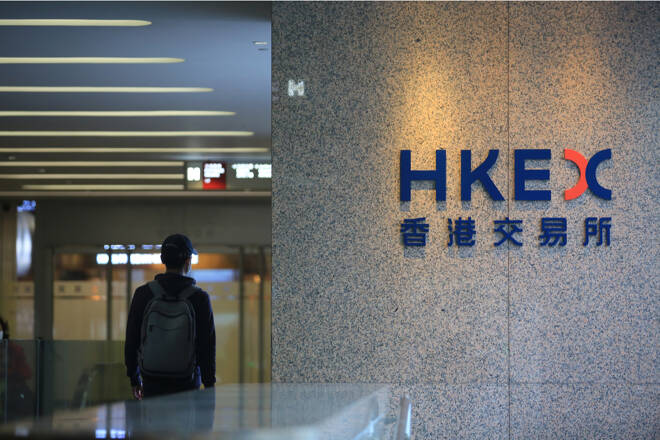Advertisement
Advertisement
Hang Seng Index, Nikkei Index, ASX 200: Aussie Stats, the BoJ, and the Fed
By:
Key Points:
- On Wednesday, the Hang Seng Index eked out a modest gain, while the ASX 200 and Nikkei ended the session in negative territory.
- Investors reacted to comments from Fed Chair Powell, who affirmed investor bets on a less dovish Fed rate path.
- On Thursday, the US equity market trends from Wednesday, and the Asian economic calendar warrants investor attention.
US Equity Markets: FOMC Members and Yields
On Wednesday, corporate earnings, concerns about the Middle East, and expectations of a more hawkish Fed rate path impacted risk sentiment. Tech stocks bore the brunt of the pullback.
On Wednesday, the Dow declined by 0.12%. The Nasdaq Composite Index and the S&P 500 saw losses of 1.15% and 0.58%, respectively.
Asian Economic Calendar: Aussie Labor Market Data and the BoJ
On Thursday, Australian labor market data could influence the RBA rate path. Economists forecast Australian employment to increase by 7.2k in March after surging by 116.5k in February. Moreover, economists predict the Australian unemployment rate to increase from 3.7% to 3.9%.
A deterioration in labor market conditions could impact wage growth and reduce disposable income. Downward trends in disposable income could curb spending and dampen demand-driven inflation. The RBA could begin discussions about interest rate cuts if the outlook for spending deteriorates.
Beyond the Aussie labor market data, the RBA Bulletin and Bank of Japan commentary also need consideration.
The Australian employment numbers could impact the ASX 200 more. However, Bank of Japan forward guidance on the BoJ interest rate path could influence buyer demand for the Yen and Nikkei-listed export stocks. Bank of Japan Board member Asahi Noguchi is on the calendar to speak.
Commodities: Crude Oil, Gold, and Iron Ore
On Wednesday, WTI crude and gold (XAU/USD) ended the session with losses of 3.13% and 0.92%, respectively. Demand concerns impacted crude oil prices, with the markets also reacting to the weekly US inventory numbers. Profit-taking likely contributed to the losses as investors monitor news updates from the Middle East.
However, iron ore prices advanced by 2.74% on the Singapore Futures Exchange.
The USD/JPY, the Intervention Zone, and the Nikkei
The USD/JPY fell by 0.21% to end the session at 154.382. Downward trends in the USD/JPY could impact buyer demand for Nikkei-listed export stocks. Intervention threats remain another consideration, with the USD/JPY holding onto the 154 handle.
The Futures Markets
On Thursday, the ASX 200 was up 20 points, whereas the Nikkei was down 120 points.
ASX 200
The ASX 200 declined by 0.09% on Wednesday. Gold-related stocks and tech stocks limited the losses. The S&P ASX All Technology Index (XTX) rose by 0.09%.
Gold stocks Northern Star Resources Ltd. (NST) advanced by 0.66%, with Evolution Mining Ltd (EVN) rallying 7.49%.
Bank stocks and mining stocks had mixed sessions. ANZ Group Holdings Ltd. (ANZ) and Westpac Banking Corp. (WBC) saw gains of 0.04% and 0.12%, respectively. Commonwealth Bank of Australia (CBA) and National Australia Bank Ltd. (NAB) declined by 0.23% and 0.63%, respectively.
BHP Group Ltd (BHP) and Fortescue Metals Group Ltd. (FMG) ended the session down 1.18% and 0.12%, respectively. Rio Tinto Ltd. (RIO) advanced by 0.02%.
However, oil stocks ended the session in negative territory. Woodside Energy Group Ltd (WDS) and Santos Ltd (STO) saw losses of 1.17% and 0.12%, respectively.
Hang Seng Index
On Wednesday, the Hang Seng Index gained 0.02%. Real estate and tech stocks contributed to the gains. The Hang Seng Tech Index (HSTECH) rose by 0.07%, with the Hang Seng Mainland Properties Index (HSMPI) gaining 0.12%.
Tencent (0700) and Alibaba (9988) fell by 0.33% and 0.66%, respectively.
However, bank stocks had a mixed session. HSBC (0005) declined by 0.40%. China Construction Bank (0939) and Industrial Commercial Bank (1398) advanced by 0.42% and 0.50%, respectively.
The Nikkei 225
(Graph for reference purposes only)
The Nikkei extended its losses from Tuesday, falling by 1.32%.
Bank stocks continued to trend lower. Sumitomo Mitsui Financial Group Inc. (8316) and Mitsubishi UFJ Financial Group Inc. (8306) declined by 0.89% and 1.13%, respectively.
It was also a negative session for the main components of the Nikkei.
Sony Group Corporation (6758) slid by 2.09%. KDDI Corp. (9433) and Softbank Group Corp. (9948) saw losses of 1.63% and 1.33%, respectively.
Fast Retailing Co. Ltd. (9983) and Tokyo Electron Ltd. (8035) ended the session down 0.44% and 0.98%, respectively.
For upcoming economic events, refer to our economic calendar.
About the Author
Bob Masonauthor
With over 28 years of experience in the financial industry, Bob has worked with various global rating agencies and multinational banks. Currently he is covering currencies, commodities, alternative asset classes and global equities, focusing mostly on European and Asian markets.
Advertisement
